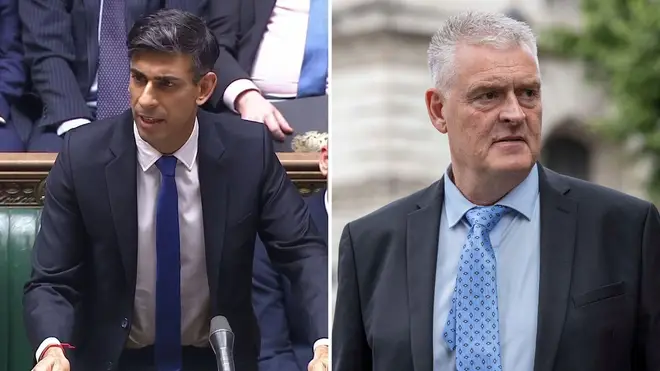
Nick Ferrari 7am - 10am
16 January 2024, 18:05 | Updated: 16 January 2024, 19:34

Rishi Sunak's bid to keep the Tories unified took a huge hit on Tuesday as dozens of Tories voted for rebel amendments to his Rwanda plan and Lee Anderson quit his senior party role.
Tory MPs backed two amendments designed to toughen up the Rwanda scheme in the Commons on Tuesday evening - against the government's wishes.
Though both amendments failed - with the government and opposition parties voting against them - there appear to be enough rebels to overturn Mr Sunak's majority and stop the bill becoming law in its current form.
It means the prime minister could lose a vote on whether the unamended bill advances on its way to becoming law.
Mr Anderson stepped down as deputy chairman of the Conservative Party after he was told to support Mr Sunak's bill or face punishment.
Mr Sunak has insisted the Rwanda bill is adequate as is, but critics within his party are increasingly emboldened to demand stronger action on migration given dreadful polling suggesting the Tories face a 1997-style wipe out at the next election.
My letter regarding tonight’s amendments. pic.twitter.com/EyneeRy4B9
— Brendan Clarke-Smith MP (@Bren4Bassetlaw) January 16, 2024
A total of 68 MPs voted for an amendment to "disapply" international law to the scheme during Tuesday's vote - a bid to circumvent the European Court of Human Rights holding up deportation flights to Rwanda.
That was a sizeable rebellion, even if it was faced down by 529 MPs who voted with the government, including opposition members.
A total of 58 Tory MPs rebelled, including former home secretary Suella Braverman and ex-prime minister Liz Truss, with eight DUP MPs and two independents, ex-Conservatives Scott Benton and Andrew Bridgen, also voting for the amendment.
Then, ex-immigration minister Robert Jenrick's amendment to restrict individuals' abilities to make claims against deportation was defeated but 58 MPs voted for it.
This amount of votes against Mr Sunak's bill would easily be able to defeat him.
He now faces a rebellion with Tory opponents potentially joining Labour, the SNP and the Lib Dems in rejecting the bill on Wednesday.
Mr Anderson was earlier warned to support the government along with Brendan Clarke-Smith, who also quit his role as deputy chairman.
The two said: "Our support for the party and Government remains as strong as ever and that is why we are so passionate about making this legislation work.
"However, we fully appreciate that with such important roles there is also the issue of being bound by collective responsibility. It is with this in mind that we fully appreciate that whilst our main wish is to strengthen the legislation, this means that in order to vote for amendments we will therefore need to offer you our resignations from our roles."
Jane Stevenson, a parliamentary private secretary to Kemi Badenoch, the business secretary, also quit her role.
The Telegraph said government chief whip Mark Harper had "made clear" that sackings would follow any rebellion on the vote tonight.
Under the Rwanda plan, some asylum seekers will be deported to Rwanda for processing. The government hopes that will act as a deterrent to people arriving on small boats in the Channel.
Read more: Boris Johnson backs Tory rebels ahead of high-stakes showdown with Rishi Sunak over Rwanda bill
The prime minister is trying to get the bill passed through the Commons to make sure it will not be blocked again by the Supreme Court, which ruled it was unlawful in November.
Judges found refugees risked being sent back to their home countries from Rwanda, where they could face further persecution.
This bill tells the courts that Rwanda is safe, but rebels believe it is not strong enough on the European Court of Human Rights (ECtHR), which asylum seekers at risk of being sent to Africa could appeal to.
Any attempts to move towards their hardline position risks alienating more moderate, One Nation Tories, and even set up a reckoning for Britain's position on the European Convention on Human Rights.
Mr Sunak, in the midst of this delicate balancing act, told the Commons: "We believe this Bill is the fastest way to get flights off the ground and will provide the missing piece to our raft of measures that will stop the boats.
"We are down 36 per cent year-on-year, we want to go further and this Bill provides that missing deterrent which we know is so effective because we have seen it when we secured the Albania returns agreement."
Mr Jenrick, who previously quit the government over concerns the Rwanda plan was not tough enough, said there were not enough detention spaces for immigration removals.
"We have to get people out of the country within days, not months. And the operational plan behind this Bill foresees that people will take months to be removed from the country," he said.
"So what will happen is that our detained capacity will be filled, people will then be bailed to hotels, they will then abscond and never be seen again. And within a single week in August this scheme will have failed."